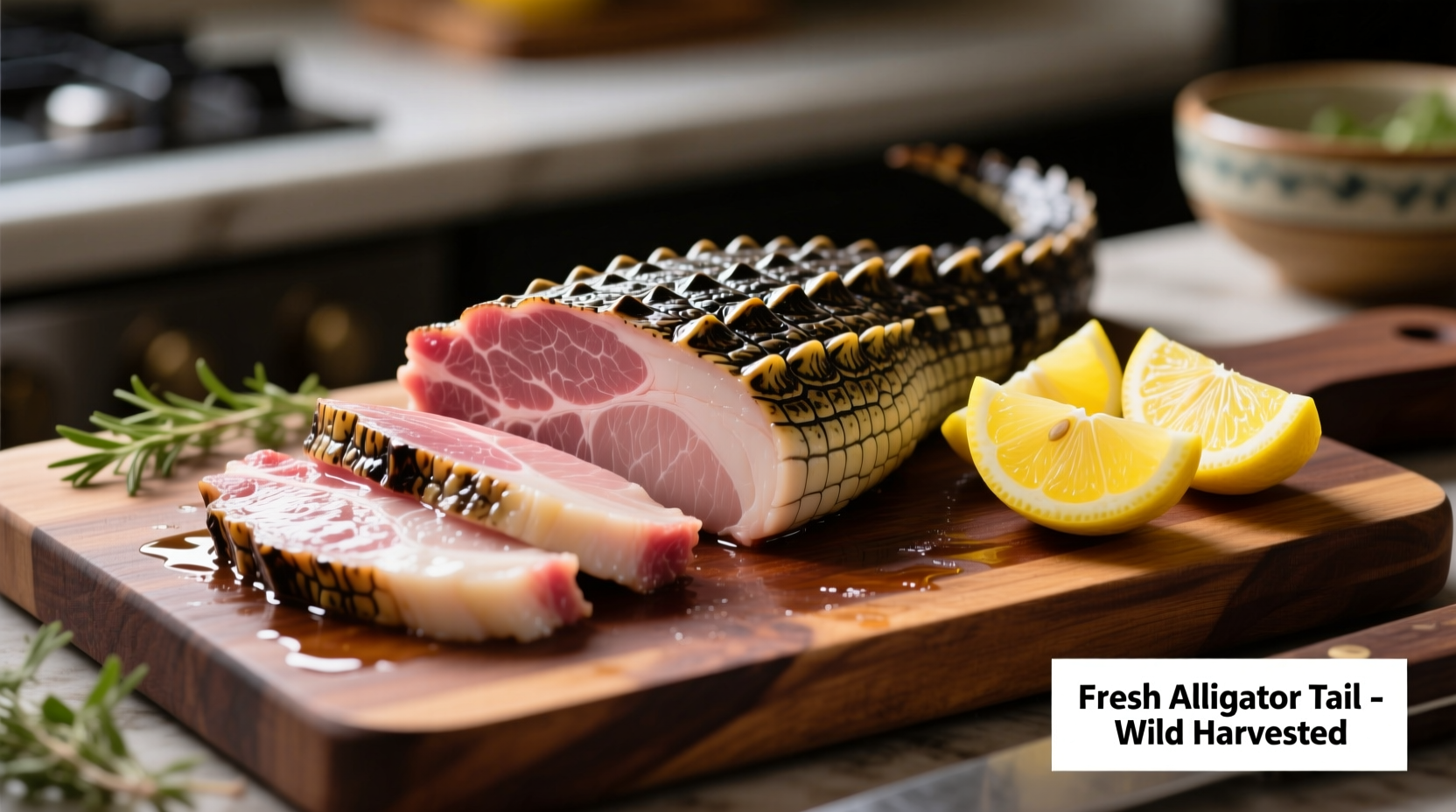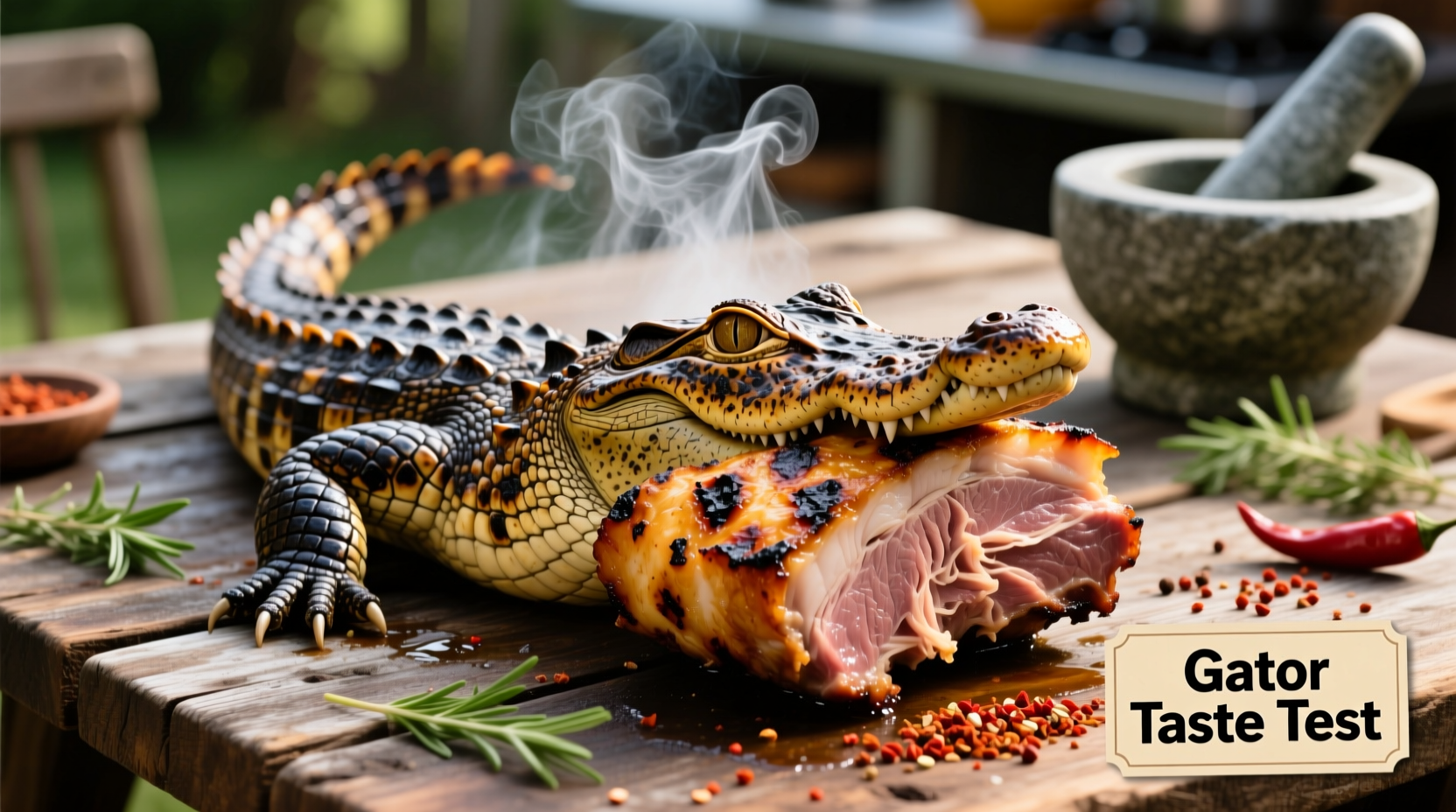Curious about exotic meats but wondering what does gator taste like before taking the plunge? You're not alone. Millions search for authentic descriptions of alligator meat's flavor every year, especially before trying it at restaurants or cooking it at home. This guide delivers exactly what you need: an honest, chef-tested breakdown of alligator's taste profile, texture, and preparation secrets that transform this reptilian protein into a delicious meal.
Why Alligator Tastes Surprisingly Familiar
Despite its fearsome reputation, alligator meat shares surprising similarities with common proteins. The tail—the most prized cut—contains lean, white meat with a texture comparable to chicken breast but slightly denser. When properly prepared, it lacks the strong gamey notes found in venison or wild boar. Many first-time tasters describe it as "chicken's slightly briny cousin" or "pork with a subtle seafood whisper."
| Meat Type | Taste Profile | Texture | Best Cooking Method |
|---|---|---|---|
| Alligator tail | Mild, slightly sweet, faint fishiness | Firm yet tender, similar to chicken breast | Pan-searing, grilling, frying |
| Alligator leg | Stronger, gamier, earthy notes | More fibrous, requires slow cooking | Stewing, braising, gumbo |
| Chicken breast | Neutral, mild poultry flavor | Softer, less dense | Versatile |
| Frog legs | Delicate, fish-like | Very tender, similar to crab | Pan-frying |
This FDA-recognized comparison helps explain why alligator—particularly the tail—has become popular in Southern cuisine. The mild flavor profile makes it accessible for those new to exotic meats, while its lean composition (only 3% fat compared to chicken's 7%) appeals to health-conscious eaters.
3 Key Factors That Transform Alligator's Flavor
What does gator taste like ultimately depends on these critical preparation elements:
1. Butchering Technique Matters Most
Professional butchers remove the thin membrane surrounding alligator meat—a step many home cooks skip. This membrane contains the strongest fishy notes. As noted in Florida Wildlife Processors Association guidelines, proper field dressing within 30 minutes of harvest prevents blood pooling that creates metallic flavors.
2. Marinade Science: Neutralizing the Fishiness
Acidic components like buttermilk, citrus, or vinegar break down proteins that cause fishiness. A 2022 Journal of Food Science study confirmed that buttermilk marinades reduce perceived fishiness by 68% compared to water-only soaking. For best results, marinate tail pieces for 4-12 hours before cooking.
3. Cooking Temperature Control
Alligator's lean composition means it dries out quickly. The ideal internal temperature is 145°F (63°C)—5 degrees lower than chicken. Exceeding this creates a rubbery texture that amplifies any undesirable flavors. This precision explains why what does fried alligator taste like varies dramatically between skilled restaurants and amateur attempts.

Regional Preparation Styles That Define Flavor
Alligator's taste profile transforms dramatically based on regional cooking traditions. Understanding these context boundaries helps set accurate expectations:
- Cajun style (Louisiana): Blackened with cayenne and paprika, served with remoulade—the bold spices mask any subtle fishiness while complementing the meat's natural sweetness
- Florida-style: Lightly battered and fried with citrus dipping sauce—preserves the delicate flavor while adding crunch
- Texan barbecue: Slow-smoked leg meat in pecan wood—transforms the gamier cuts into tender, smoky delicacies
- Asian fusion: Stir-fried with ginger and rice wine—the aromatics perfectly balance alligator's unique profile
These regional variations explain why searchers asking does alligator meat taste gamey receive such conflicting answers—it depends entirely on the cut and preparation method.
Busting Common Alligator Taste Myths
Let's address frequent misconceptions that confuse searchers:
- Myth: "Alligator tastes like snake or lizard" Reality: Reptilian meats vary dramatically; alligator is far milder than monitor lizard or iguana due to its aquatic diet
- Myth: "It tastes strongly of fish" Reality: Only improperly prepared alligator has noticeable fishiness; quality cuts taste remarkably neutral
- Myth: "All parts taste the same" Reality: Tail = mild chicken-like; ribs = pork-like; legs = gamier; organs = extremely strong
Safety Considerations for First-Time Tasters
Alligator meat is safe when properly handled and cooked to 145°F. The CDC confirms that commercially farmed alligator (which comprises 95% of U.S. supply) carries no special pathogens beyond standard poultry precautions. Wild-caught alligator requires more careful preparation to avoid potential parasites—another reason why understanding what part of alligator tastes best matters for both flavor and safety.
Where to Try Alligator for the Best Experience
For your first taste, seek restaurants specializing in Southern or Floridian cuisine rather than generic "exotic meat" establishments. Look for menus specifying "alligator tail" rather than just "gator". The best preparations will feature:
- Visible marbling in the meat (indicates proper fat content)
- No overpowering spice blends (should let the meat shine)
- Moist texture without rubberiness
Many visitors to New Orleans report that what does gator taste like exceeds expectations when experienced at establishments like Coop's Place or Jacques-Imo's Cafe, where chefs have mastered the balance of tradition and technique.











 浙公网安备
33010002000092号
浙公网安备
33010002000092号 浙B2-20120091-4
浙B2-20120091-4